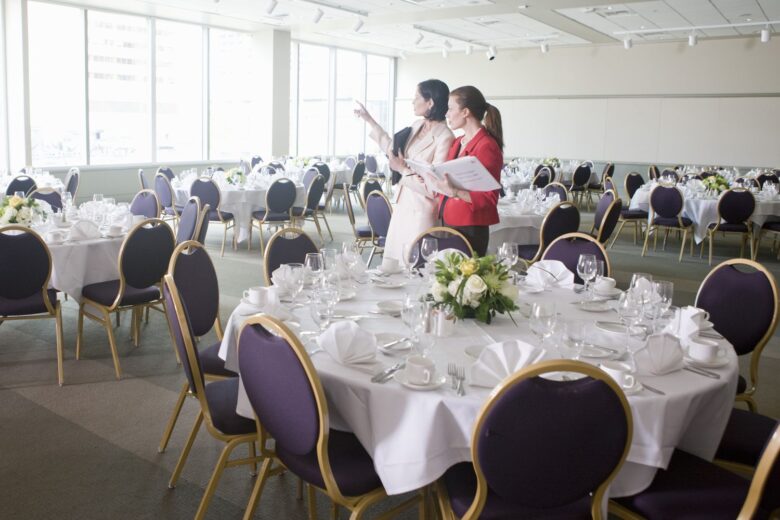In the event industry, there are many jobs and titles, and in all that confusion, explaining what someone does can be tricky. Even the professionals in this field sometimes get confused when someone asks them what is that they do. And as this industry continually and rapidly grows, this only adds to the need for more people with new job titles, duties, and specific areas of work, which is quite awesome if you work in this industry. But the confusion remains, especially when it comes to the difference between event planner and event manager.
Mixing the responsibilities and duties of these two is understandable because the skill sets for both jobs overlap. As an addition to that, many event managers work as event planners, and vice versa, which only adds to the communication problem. To be able to help people understand what professional they need, it’s more than useful to precisely establish the difference between those two.
Event Planner

Source: theperfectpackagecompany.co.uk
The name itself, planning, explains the focus of the job, and whenever someone wants to start, create, or organize something, it needs a solid plan for everything to be executed flawlessly. Whether it is a convention, wedding, or a charity gala, every person needs detailed plans drawn much before the event commencing.
Among all other details, the first and most important thing is to decide a budget, as everything else will, more or less, depend on it. The other, quite significant details are the best date and venues, and maybe the most complicated one, choosing the right theme for the occasion.
For the event planner, all the work, from start to finish, is along with the client. It all starts with the original concept of a specific event, and when that is determined, the next part is working out all the main aspects that need to be in place before the event occurs. To be the best in this industry, the professionals in this field should know to listen to their clients’ needs and wishes to be able to make that vision work in practical reality.
The purpose and the goal of event planners are not only to plan everything from scratch but also to meet all the client’s objectives and ensure that everything is in place so that event can go smoothly. The job demands dedication and an eye for small details, but you can also describe them as the “big picture” persons.
Some tasks of the event planner might include:

Source: fortnite-event.com
- Meeting with the client to understand and find out the goal of the event
- Scoping relevant details such as time and date, location and the budget
- Working that bright mind to come up with the best idea for the theme of the event
- Designing the invitations
- Finding the best venue that meets both the goal, and the budget, by meeting and listening to the vendors’ bids
- Picking the right entertainment (quite important)
- Finding and deciding on the caterer and the menu
- Coordinating services and logistics which includes equipment to run the event and technology (food, drinks, transportation, lodging, etc.)
- Managing and negotiating vendor contracts
- Overseeing that everything goes well and works as it should be, but also stays within the budget
- Making sure that vendors, caterers, etc. are paid
Event Manager

Source: eventdeals.com
On the contrary to the event planner whose job consists of a more fundamental part of the happening, the event manager is in charge of more fines type of work, making it all shine and go like a clockwork. And exactly like clockwork, if something unpredicted occurs, which causes a slowing down of the event motion, the job of the management is to get on top of that and solve the problem so that everything can go back and continue as scheduled.
For an event to be great, both the event planning and managing must work together. What this means is that while the first one is present from the begging to the end, the manager’s job is before and during the event, as it overviews every mattering detail that the event planner created and figuring out a practical way for making that happen.
Planer and manager both have some similar work, and the manager is also involved in dealing with vendors, making sure that everything is ready and in order. The difference between those two is in the specific areas of work needed, and it can be explained easily. The planner needs to book the proper venue, and the manager is there to overlook everything, making sure that every vendor (caterer, band, flower arrangement, etc.) knows where to set up, and among all other, that there is enough parking space at the event location.
The type of work that manager might be in charge of contains:

Source: globeinfinite.com
- Coming up with the best solution and implement every concept and plan
- Also making sure that every expenditure stays within the budget
- Dealing with vendors – negotiating and picking the right one
- Having a contingency plan for every possible scenario
- Dealing with all the necessary permits
- Learning every health and safety standard and making sure that everything complies with it.
- Making sure that the staff has everything they might need (and to know their job)
- Having a feedback survey for the event
- Dealing with all the reports after the event
The main thing about the whole event management is that it needs to coordinate every aspect to make everything perfect. As the one responsible for creating contingency plans, some people refer to event management as crisis management.
To make everything clear, those two must overlook each other and work together, and without one of them, having the perfect event couldn’t be possible. To make the event special, what someone needs is both the event planner and event manager, and although the job descriptions might confuse someone, what you need to know is that with them, you, as a client, will not have to worry. You can find more information on event management, and what it includes at cryptopolitan.com, as well as some great advice on how to stand out if you are already working in this industry.




